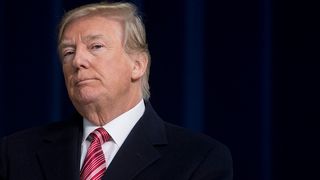So much of the defeated former president’s term of office was unprecedented. Donald Trump was the first president elected without having served previously in government or the military; Trump was impeached twice for abuse of his constitutional power; no former president in recent times refused to attend his successor’s inauguration to the office...
And as of now, no former president had been criminally referred to the Department of Justice to assess potential indictment for alleged crimes committed in office. If Trump is indicted, he would be the first president to be so charged. (For fans of Hamilton the musical, there is one former vice president who was indicted and tried. Aaron Burr, who killed Alexander Hamilton in a duel, was charged years later for treason against the United States but was acquitted by a jury in Virginia.)
And as of now, no former president had been criminally referred to the Department of Justice to assess potential indictment for alleged crimes committed in office.
The committee’s report documented that Trump knew he lost the 2020 presidential election. That Trump pressured state officials, the Justice Department and vice president Mike Pence to overturn the election. The committee documented that Trump summoned the mob to Washington and took no action to stop the violence by asking his supporters to leave the Capitol. Democrat representative Elaine Luria said: “President Trump lit the flame, he poured gasoline on the fire and sat by in the White House dining room for hours watching the fire burn and today he still continues to fan those flames. That was his extreme dereliction of duty” to “take care that the laws are faithfully executed”.
Criminal justice is exacted by the executive branch. What the January 6 committee has done, in finding that Trump and others have likely committed crimes that strike at the heart of America’s democracy, is give validation to the grand juries convened by Attorney-General Merrick Garland to examine whether Trump and others obstructed the work of Congress in certifying the results of the 2020 election and, by seeking to overturn the will of the voters in the election, defrauded the United States. The select committee concurs that these potential felonies must be fully vetted.
The select committee has also made a criminal referral on a charge of insurrection. Can you imagine what would happen in Australia if a prime minister incited a mob to attack Parliament House, surge through the barriers, break into the House and Senate chambers, and stop the proceedings? The Australian Federal Police and the Department of Public Prosecutions would be all over it.
What happens from here? Trump has one playbook: decry, denounce, discredit and defame. Trump will once again rail against the “witch-hunt” by the radical left Democrats and the deep state enemies that are arrayed against him. To his extensive base of supporters, what comes out of Washington and the investigations is just so much noise. After the FBI raided his home in Mar-a-Lago (another unprecedented event) to recover hundreds of secret government documents, Trump got a big bump in support. He seeks the same result now.
What happens from here? Trump has one playbook: decry, denounce, discredit and defame.
The attorney-general, when all this evidence is assessed by the grand jury, will face a judgment on whether to indict Trump. To provide a further buffer against being seen to act with political motive and malice, Garland has appointed a special counsel, Jack Smith, to see this final phase of the investigation completed. What Garland wants to avoid is an indictment of Trump in the midst of the 2024 presidential campaign – to avoid the bias many perceived in 2016 when the director of the FBI twice impugned Hillary Clinton at the height of her presidential run. Many believe that cost her the election. There will be campaign events next August and September in states that have primaries in 2024. This suggests that if an indictment of Trump is to come, it should be sought and obtained before the end of July – before the political season commences.
The work of the January 6 committee should be seen in a deeper context. More than two decades ago, after the 9/11 attack by al-Qaeda against the United States, with nearly 3000 dead and the country at war, Congress convened a special bipartisan commission to examine and provide a full accounting of what happened that day, who was responsible, and what should be done to protect America from any such future attack. Its work resulted in the anti-terrorism measures and other safeguards in place today.
January 6 was a direct assault on America’s democracy. A bipartisan select committee has provided a thorough record, drawn substantially on the testimony not of Democrats and Trump critics but of the men and women who served Trump and worked closely with him every day.
It is their evidence as Trump loyalists that has enabled for all to see what happened that day, what led to it in the months preceding the insurrection, and who was responsible for this atrocity.
It is now up to the Congress, and the executive branch, and the American people to resolve that there must never be a president who is able to overturn an election and carry out a coup against the United States – that a crime against democracy carries an exceptionally heavy price.






